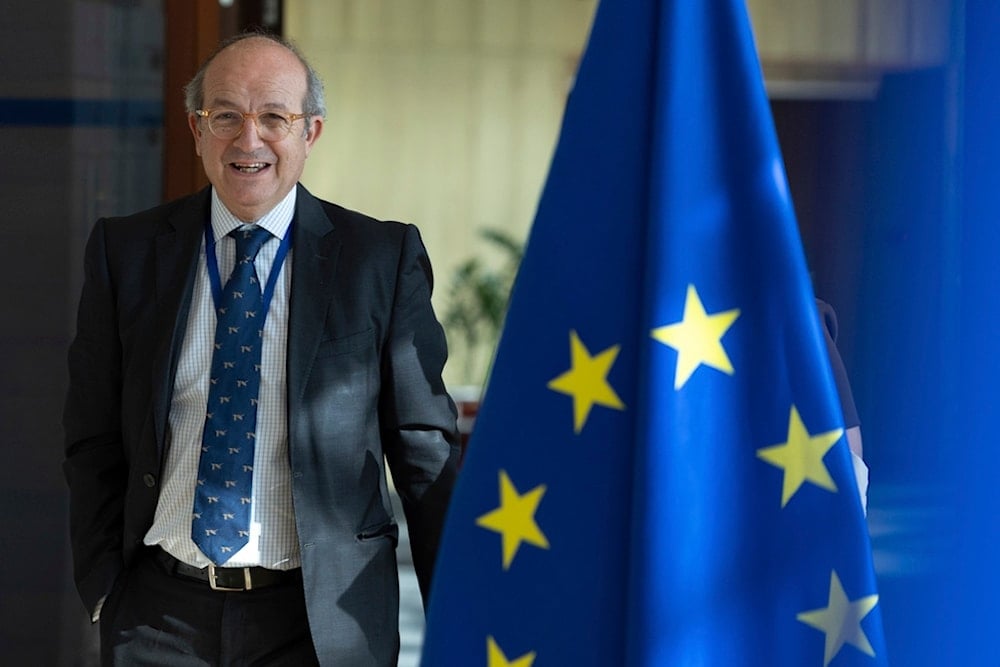EU defense chief urges US to coordinate troop withdrawal with allies
The EU’s defense commissioner urges the US to coordinate any troop withdrawal from Europe, warning that the “era of relying on America for defense is over.”
-

European Commissioner for Defense and Space Andrius Kubilius arrives for the weekly college of commissioners meeting at EU headquarters in Brussels, Wednesday, May 21, 2025 (AP)
The European Union’s top defense official has called on the Trump administration to closely coordinate any withdrawal of US forces from Europe with Washington’s NATO partners, as European governments brace for what could be the first significant shift in transatlantic security arrangements in decades.
In an interview for The Washington Post, European Commissioner for Defense Andrius Kubilius said he wants “a clear, practical agreement with America” that outlines the timeline and structure of any troop reductions. He stressed that such coordination is needed to allow European militaries to rotate forces into place and prevent security gaps.
His comments came after the US announced last week that it would be returning some troops from Romania and other NATO countries on Europe’s eastern flank, the first move by the Trump administration to reduce its military footprint on the continent, which has relied on US security guarantees since World War II.
'Era of relying on the US is over'
Kubilius, a former Lithuanian prime minister known for his firm stance on Russia, warned that Europe must adjust to a new strategic reality.
He said Europe can no longer assume it lives in a world “like we were living for more than 70 years, where Americans take care of our defense, and we are enjoying this peace dividend.”
“It’s over,” Kubilius said. “So then we need to start to prepare ourselves.”
The brigade rotation ending in Romania, around 3,000 troops, represents only a fraction of US forces in Europe. But the shift has intensified questions across NATO capitals as the Pentagon finalizes a new global defense posture that will place less emphasis on Europe and Africa in favor of the US homeland and, to a lesser extent, Asia.
Europe seeks time to replace US capabilities
Kubilius and other European officials want clarity on when and how fast the US may adjust deployments.
“The question is when, at which speed and so on,” he said. His request for Washington, he added, is for “a clear calendar” coordinated quietly with US officials; “maybe it’s secret, whatever, there’s no need to announce it.”
He argued that having a timeline would allow Europe to plan investments in defense technologies and logistics, especially in areas where the US currently provides critical support, such as strategic airlift and intelligence capabilities. “Then we need to have our plans, how much to invest, which technologies to develop,” he said.
Concerns in Eastern Europe, Baltic states
NATO officials say they are in communication with the US and were informed ahead of the Romania adjustment. But several Eastern European and Baltic states fear that a reduction of US forces near Russia and Ukraine could embolden Moscow.
European diplomats say the Trump administration has made clear that Europe must “take primary responsibility for the conventional defense of the continent.” Last month, US War Secretary Pete Hegseth told NATO counterparts that Washington “will do our part, but Europeans must continue to take primary responsibility.”
Kubilius agreed, saying, “Americans who are asking us to take responsibility for the European continent are absolutely right.” He added that shifting geopolitical dynamics, including the need to counter rising Chinese military power, mean Europe must be prepared to defend itself sooner rather than later.
Trump criticizes Europeans as 'freeloaders'
US President Donald Trump, back in March, accused European nations of failing to share the burden in military operations. "Yeah, I think they've been freeloading," Trump told reporters, echoing remarks made by Vice President JD Vance and War Secretary Pete Hegseth.
According to The Atlantic, the comments surfaced after its editor-in-chief, Jeffrey Goldberg, was accidentally added to a Signal chat titled "Houthi PC small group" on March 13. The group, which included Vance, Hegseth, Secretary of State Marco Rubio, CIA Director John Ratcliffe, and DNI Tulsi Gabbard, had been coordinating the Yemen aggression in real time.
In the conversation, Vance expressed frustration with the US role in the operation, saying, "I just hate bailing Europe out again." Hegseth responded, "I fully share your loathing of European freeloading. It's PATHETIC." Goldberg later described the chat as a "shockingly reckless" exchange of sensitive military information, including targeting data and weapon deployment plans.
Following public exposure of the leak, the White House pushed back, characterizing the criticism as a distraction. "This is a coordinated effort to distract from the successful actions taken by President Trump and his administration to make America's enemies pay and keep Americans safe," a spokesperson said. The National Security Council confirmed the authenticity of the chat and has opened an internal investigation into how Goldberg's number was mistakenly added.

 5 Min Read
5 Min Read









